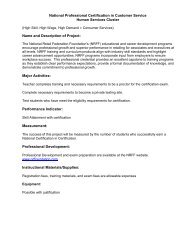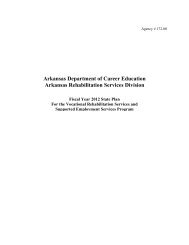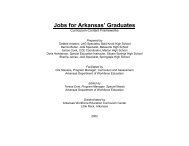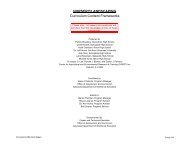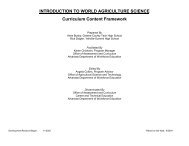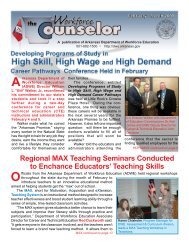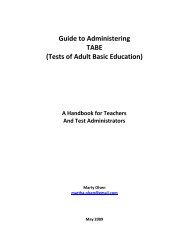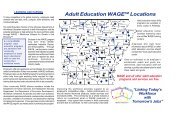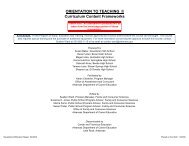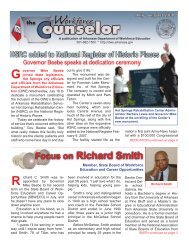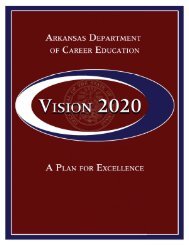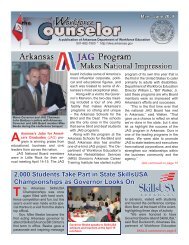Adult Education Services - Arkansas Department of Career Education
Adult Education Services - Arkansas Department of Career Education
Adult Education Services - Arkansas Department of Career Education
You also want an ePaper? Increase the reach of your titles
YUMPU automatically turns print PDFs into web optimized ePapers that Google loves.
<strong>Adult</strong> <strong>Education</strong> <strong>Services</strong><br />
With changing technology, ongoing welfare reform efforts, and the rising numbers <strong>of</strong> people from<br />
all over the world coming to <strong>Arkansas</strong> to live, the role <strong>of</strong> adult education is more important than<br />
ever before.<br />
Many Arkansans perceive adult education programs as places to earn a GED. But, there’s<br />
much more. Nearly 68,000 Arkansans received adult education services in fiscal year 2001. In<br />
addition to adults seeking improvements in their basic educational skills, these numbers include<br />
many “new” Arkansans who come to adult education to learn to speak English and take advantage<br />
<strong>of</strong> other English as a Second Language (ESL) services. Workplace education programs<br />
reached employees in 183 companies, and 9,141 Arkansans (or 82% <strong>of</strong> those who took the GED<br />
test), earned their GED credential, the <strong>Arkansas</strong> High School Diploma, in calendar year 2001.<br />
Screening for vision problems and other possible learning disabilities is also available in<br />
many adult education centers - adults who have had lifelong trouble with learning may have a<br />
vision problem or other learning difficulty.<br />
Program Locations<br />
<strong>Adult</strong> education programs are available<br />
in every county in <strong>Arkansas</strong>.<br />
<strong>Adult</strong> education center locations marked<br />
by stars are also certfied WAGE training<br />
centers (see other side for more information<br />
on WAGE).<br />
Once an individual or an employer’s educational<br />
needs and goals are determined, adult education<br />
staff will develop a quality educational plan to meet<br />
these needs and goals.<br />
To succeed in supporting themselves and their families, adults must have solid basic academic<br />
skills - in reading, writing, and math. Children growing up in families with low academic skills are<br />
likely to have difficulty seeking work and/or raising a family as adults, leading to another generation<br />
<strong>of</strong> frustration. <strong>Adult</strong> education is available to help.<br />
For more information, call your local adult education center or the<br />
<strong>Adult</strong> <strong>Education</strong> Section <strong>of</strong> the <strong>Department</strong> <strong>of</strong> Workforce <strong>Education</strong><br />
at (501) 682-1970, or visit the website at www.work-ed.state.ar.us
<strong>Adult</strong> education can help an employee gain<br />
a job, retain a job, and improve earning<br />
through work-based education.<br />
<strong>Adult</strong> education can help the employer<br />
overcome the shortage <strong>of</strong> skilled workers by<br />
teaching basic skills within the context <strong>of</strong> a local<br />
community’s working environments.<br />
<strong>Adult</strong> education’s Workforce Alliance for Growth in the Economy TM (WAGE) program partners local<br />
adult education with local business and industry to enhance the basic skills <strong>of</strong> each community’s workforce.<br />
Students in the WAGE program may earn three WAGE<br />
certificates: Industrial, Clerical, and Employability.<br />
Through WAGE, participants master business-andindustry-accepted<br />
competencies within each basic skill<br />
area as required by each certificate. Instruction is<br />
customized to local business and industry needs.<br />
Employers <strong>of</strong>fer job applicants and candidates for<br />
promotion added consideration if they have earned a WAGE certificate. Employers also use<br />
the WAGE program for existing workers to either help them gain enabling skills required for<br />
high-performance work standards and/or prepare them for technical training that requires<br />
basic educational skills to be successful.<br />
Other community WAGE alliance members include the <strong>Department</strong> <strong>of</strong> Human <strong>Services</strong>, the<br />
Employment Security <strong>Department</strong>, the <strong>Department</strong> <strong>of</strong> Economic Development, Workforce<br />
Investment Act boards and other local economic development agencies and boards,<br />
postsecondary educational providers, chambers <strong>of</strong> commerce, and employment training and<br />
placement agencies. These partners provide referrals to the WAGE program, as well as<br />
assist in promoting the program.<br />
Arkansans who want more information about WAGE or other adult education services should<br />
contact their local adult education center or the <strong>Adult</strong> <strong>Education</strong> Section <strong>of</strong> the <strong>Department</strong> <strong>of</strong><br />
Workforce <strong>Education</strong>. Information is provided on the other side <strong>of</strong> this page.<br />
WAGE: “Linking Today’s Workforce with Tomorrow’s Jobs”<br />
WAGE and all other adult education programs and services are free.<br />
A service <strong>of</strong> the<br />
www.work-ed.state.ar.us



